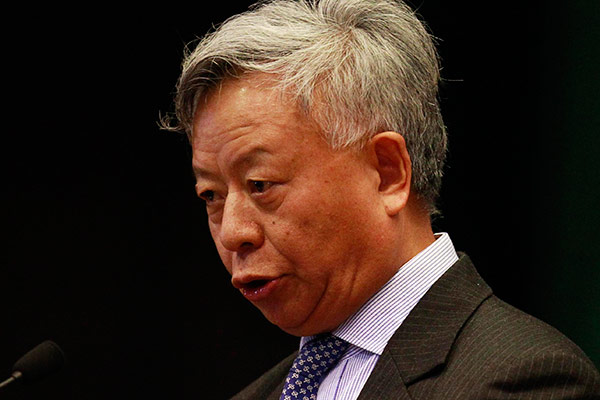 |
|
Jin Liqun, president-designate of the Asian Infrastructure Investment Bank.[Provided to China Daily] |
The new lender, which will be inaugurated later this month, plans to conduct its first board meeting next month and will support infrastructure development and connectivity in Asia, said Jin Liqun, the president-designate of the AIIB.
"The bank is neither a Chinese bank nor a bank owned by the Chinese government, but one owned by all participating countries," said Jin in Beijing on Tuesday.
Jin did not specify any priority projects for the AIIB or the countries that would be the beneficiaries of initial loans, but said around 30 countries are waiting in line for membership and this would increase the bank's capital.
"There are 50 applicants in the fray for the position of deputy head of the AIIB," said Jin, the former chairman of investment bank China International Capital Corp.
Urging European experts to join the lender, Jin said their services are necessary for the AIIB during the growth phase. Going forward, the AIIB will look to jointly fund infrastructure projects in Europe.
"The AIIB should not be limited to Asian countries, and it can only succeed if European and countries from other continents join," said Jin.
Jin, however, said that the idea of having more members is not because Asia is not up to the job, but rather the emphasis that developed countries, particularly European countries, could share their experiences in running international institutions.
"It is crazy to reject any other countries in the world and not to seek advice in running the bank, and for European countries, joining the AIIB is an opportunity to do different things and do things differently," Jin said.
The United Kingdom applied to join the AIIB as a founding member in March, and this has prompted more European countries to follow suit, he said.
Suma Chakrabarti, president of the European Bank for Reconstruction and Development, said earlier that the AIIB has important implications for EBRD as the combined strength of the two could allow them to take on much larger projects.
EBRD said it is keenly eyeing opportunities to work closely with the AIIB.
According to Jin, the US dollar would be the operating currency of the AIIB for its convenience while the bank would also take into consideration financing requests in other currencies, including the yuan.
In response to doubts and skepticism about the creation of the AIIB and whether it will compete with existing institutions, Jin said each phase of development should have a new type of modern institution to meet the needs of that time, citing examples like the Asian Development Bank set up half a century ago.
Allaying concerns and the harsh, sometimes hostile comments on what China needs to do and whether it was necessary to set up the AIIB, Jin said there is no doubt that Asia's infrastructure development will take off in the next 15 to 20 years.
"It's important to explore the possibilities of a new type of bank and a new approach to deal with the emerging economic and social development issues, as the backlog in Asia's infrastructure development has contributed to a bottleneck in social development, climate change and other serious problems," he said.
The bank has already initiated talks with other institutions, including the ADB and the World Bank, said Jin.
Cyril Muller, former director for banking and debt management in the World Bank Treasury, said in March during the Boao Forum for 2015 Asia Annual Conference that AIIB could learn from previous experience and cooperate with existing organizations.
